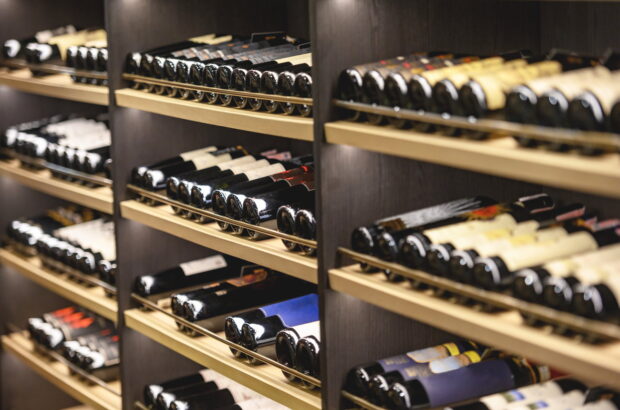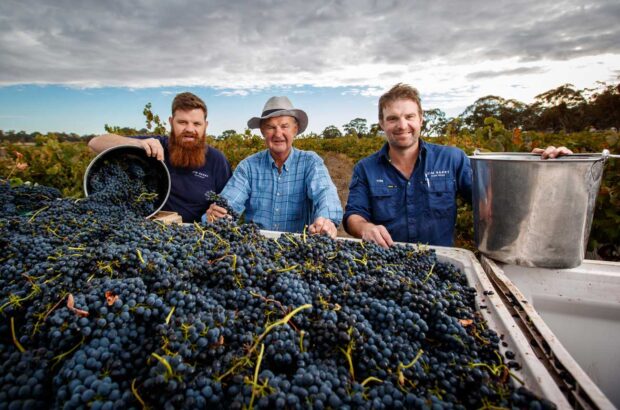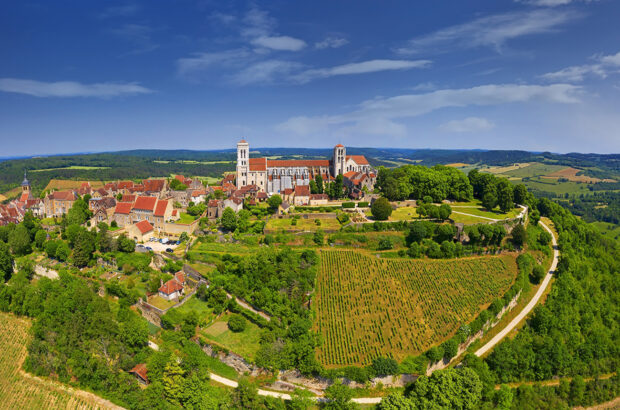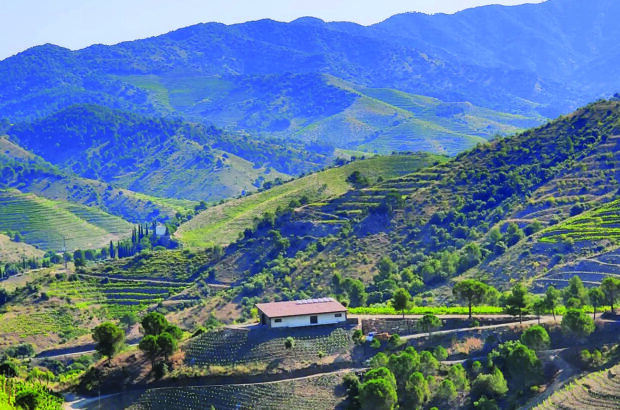I wanted to preserve something from the past,’ says Paul Siguqa, standing in his stylish new tasting room in Franschhoek. ‘This is where they used to pay the people who worked on the farm – in wine. It was the dop room. People queued at this very door. Alcohol was a way of creating dependency.’
Brought up by a labourer on a wine farm, Siguqa is an entrepreneur who made money in communications before buying Klein Goederust in 2019. He decided to keep the name of the run-down estate that dated back to 1905. ‘The oppressors are part of the history of the farm,’ he says. ‘The good and bad need to be acknowledged.’
The dop system (dop is the Afrikaans word for an alcoholic drink) is a thing of the past, thank goodness, although its illegal use survived for much longer than some people are prepared to admit. Black farm workers are better treated than they were under apartheid, but agricultural labour remains arduous and poorly paid. Siguqa’s story is a rare example of accelerated social mobility within the wine industry. ‘We’ve shown people that it’s possible. A black person can own a wine estate and farm successfully. That’s why this is significant.’
A welcome change
But what about transformation in general? Well, after a number of false starts and dead ends since 1994, when South Africa’s first post-apartheid, democratic national elections were held, things are finally changing for the better. The Wine Arc, a brand home and hub for 13 black-owned brands – Aslina Wines, Bayede, Cape Dreams, Carmen Stevens, Koni Wines, La RicMal, Libby’s Pride, Mhudi Wines, Paardenkloof, Ses’fikile Wines, Tesselaarsdal, The Bridge of Hope and Thokozani – opened in Stellenbosch last year, and the number of black oenology graduates from Stellenbosch University and Elsenburg Agricultural College is growing exponentially, following the pioneering example of Carmen Stevens, South Africa’s first woman of colour to graduate from winemaking college, in 1995.
As more of those graduates succeed, others will follow. There are currently about 60 winemakers and assistant winemakers of colour in the Cape out of a total of 940. Not so long ago, Rüdger van Wyk, arguably the most successful young black winemaker in the country at Stark-Condé, was a rarity. But now there are an increasing number in important positions. There’s been a welcome momentum shift.
Many of these winemakers have been through the Cape Winemakers Guild’s Protégé Programme, launched back in 2006. The three-year paid internship with Guild members aims to ‘cultivate the next generation of award-winning winemakers, viticulturists and future policymakers through mentorship and self- empowerment’, says former Guild chair Andrea Mullineux. To date, 31 protégés have completed the programme and 18 are employed in leading winemaker roles or have their own projects.
Ones to watch
As well as van Wyk, the protégés’ list includes Clayton Christians (Cape Classics), Ricardo Cloete (Bellingham Wines), Mahalia Kotjane (Lievland), Thornton Pillay (The Drift), Wade Sander (Brunia Wines), Kiara Scott (Brookdale Estate), Morgan Steyn (De Grendel) and Banele Vakele (Tembela Wines).
Other young black winemakers and entrepreneurs who are making names for themselves include Joe Beziek (Cloof), Nongcebo ‘Noni’ Langa (Delheim), Arlene Mains (Vilafonté), Andiswa Mapheleba (Boschendal), Berene Sauls (Tesselaarsdal) and Natasha Williams (Bosman and Lelie van Saron).
Until comparatively recently, black-owned brands were perceived as being of ‘substandard quality’, according to Denise Stubbs of Thokozani. There were certainly wines that demonstrated otherwise, not least from the now defunct Thandi Wine Estate, which became the first certified Fairtrade wine brand in the world in 2003 and enjoyed a strong consumer following overseas. But Stubbs has a point. Too many black producers bought mediocre bulk wines and bottled them with their own label in the vain hope of success.
Now, the best wines can compete on quality, regardless of who made them. ‘I want to be judged by the wine I put in the bottle,’ says van Wyk, ‘not by the colour of my skin.’
Rüdger van Wyk
Stark-Condé and Kara-Tara

Credit: Bakkes Images
Rugby and wine often go together in South Africa. And that was the initial link for Rüdger van Wyk, who first toured the winelands on a school sports tour. Having an oenologist brother also helped. ‘We used to sample murky wines together and he would explain why they looked like that and how they were fined and filtered,’ he says. That was how a ‘coloured kid from George’ decided to become a winemaker. When he later tasted a bottle of Champagne Salon 1999, his aim was to produce something as beautiful.
Van Wyk studied at Stellenbosch University before becoming a Cape Winemakers Guild protégé. Internships at Kanonkop and Nitída helped him develop his skills, but the tipping point was a trip to Burgundy in 2015. ‘Granted the opportunity, every young winemaker should do a harvest in France. It changed my mind about everything.’
Starting as assistant to José Condé at Stark-Condé, he was promoted to the top job by 2018, the same year he won the Diners Club Young Winemaker of the Year award. Working at wine shows, he had sometimes been mistaken for someone who was there to empty the spittoons, but as his star rose people began to take notice.
As well as the superb Stark-Condé range, focused on some of the best vineyards in the Jonkershoek Valley, van Wyk makes a Chardonnay and two Pinot Noirs under his cool climate Kara-Tara label. That Burgundy trip still resonates.
Stark-Condé, Three Pines Cabernet Sauvignon, Stellenbosch 2018
Kiara Scott
Brookdale Estate

Audrey de Villiers likes to display photos of her family on the walls of her house in Mitchells Plain, as well as certificates attesting their personal achievements. Give it a few more years and she’ll run out of space for the awards that her granddaughter Kiara Scott will amass. At barely 30 years old, this young winemaker is a future Cape superstar.
Mitchells Plain, a township just outside Cape Town, is better known for drugs and gangs – I saw someone shooting up in the street when I was there on a Sunday afternoon – and, says Scott, was a character-forming place to grow up. ‘Only one other person I knew at school went to university. Some amazingly talented people come from here, but the odds are stacked against them.’
Scott didn’t let her background deter her. She’s energetic, engaging and always smiling. A graduate of Elsenburg Agricultural College as well as a Cape Winemakers Guild protégé, she cites Carmen Stevens as an inspiration. ‘She showed me what you can achieve through hard work and determination.’
Employed as an assistant by Duncan Savage of Savage Wines, Scott became involved in the new Brookdale Estate project in Paarl, where Savage was consultant. She helped make the maiden 2017 vintage and was appointed chief winemaker in 2019. Brookdale produces five wines, including a remarkable 16-variety white field blend. Scott’s grandmother used to be teetotal, but these days Audrey de Villiers is happy to sip a glass of her granddaughter’s Brookdale Chenin. ‘My family is really proud of what I do,’ beams Scott.
Brookdale, Sixteen Field Blend, Paarl 2021
Wade Sander
Brunia Wines

‘A sheep farmer planted it,’ says Wade Sander of the 400ha Cold Mountain farm of flowers, figs, vegetables and wine grapes that his family acquired in 2016. Tucked away in the little-known Sondagskloof ward of Walker Bay, close to the road between Hermanus and Cape Agulhas, the winery specialises in Sauvignon Blanc, with smaller plantings of Chardonnay, Pinot Noir, Semillon and Syrah. It’s a very promising cool-climate site that’s producing exciting things in the hands of this talented young winemaker and his viticulturist brother Brett.
Originally from Johannesburg, Sander is unusual among the new generation of black winemakers. Not only does he have access to 17ha of his own organically farmed grapes, but he was also brought up in a family that drank wine and had what he calls a ‘modest collection’ of good bottles. After studying viticulture and oenology at Elsenburg Agricultural College, Sander became a Cape Winemakers Guild protégé, working at Le Riche, Bouchard Finlayson and Mullineux & Leeu Family Wines, as well as overseas in California, Jura, the Mosel and the Loire Valley.
Armed with a qualification from the University of Cape Town School of Business, Sander is an entrepreneur as well as a talented winemaker. ‘Black wine entrepreneurs are still met with some scepticism,’ he says, ‘even though there has been black participation in the wine industry from its beginnings at the farm worker level. But that’s changing. The challenge is to transition from participation to ownership to excellence.’
Brunia, White Blend, Sondagskloof, Walker Bay 2019
Nongcebo Langa
Delheim

Credit: Bakkes Images
She isn’t the only Cape winemaker to have grown up in Pietermaritzburg in KwaZulu-Natal province, but Nongcebo Langa is definitely unique in one striking respect: Noni, as everyone calls her, is a 28-year-old Zulu woman who was recently appointed as winemaker at a leading Stellenbosch estate. No one has ever achieved that.
Her interest in wine was piqued by a careers talk given by the department of agriculture at her school. It offered her two things: ‘the thrill of a challenge and the chance to travel the world’. A brilliant student, she won a scholarship to Stellenbosch University, where she completed her undergraduate and master’s degrees in oenology.
Offered a job as an intern by Delheim’s head winemaker Roelof Lotriet, Langa became a full-time team member in 2019 and winemaker earlier this year. ‘People sometimes ask me if Noni was a Black Economic Empowerment appointment,’ says Lotriet. ‘Then they start talking to her and realise how smart she is.’ As well as Lotriet, Langa cites Ntsiki Biyela of Aslina as a mentor and inspiration.
At Delheim, Langa helps to make the Aslina wines as well as the estate’s increasingly impressive, terroir-focused range from its Simonsberg vineyards – the Vera Cruz Pinotage (see below) and Edelspatz Noble Late Harvest sweet wine (2019, £24.99/37.5cl Direct Wine Shipments) are both worth seeking out. So far, she’s only worked overseas in California, but when I spoke to her, she was about to head off to the Pfalz in Germany to ‘learn the art of Riesling’. She’s finally travelling the world.
Delheim, Vera Cruz Pinotage, Simonsberg, Stellenbosch 2017
Natasha Williams
Bosman Family Vineyards and Lelie van Saron

Alcohol was forbidden when Natasha Williams was growing up in Saron in Swartland. Her parents didn’t drink, partly for religious reasons, but also because they’d witnessed what alcoholism had done to their community. ‘Our neighbourhood had numerous shebeens [illicit bars],’ she says, ‘and children born with foetal alcohol syndrome were common.’ So when a careers advisor suggested she study winemaking, she was ‘confused and upset’.
Instead, she went to Stellenbosch University to read molecular biology. But six months into her course, Williams changed her mind. She’d spoken to friends on the viticulture and oenology course and realised that wine ‘combined my interest in science and my love of nature’. A subsequent six-month internship at Jordan confirmed her choice. ‘I loved working in the vineyards, processing the grapes, smelling these amazing aromas in the cellar and making a product that people could enjoy.’
She joined Bosman in 2014, working under the brilliant Corlea Fourie, and is one of a number of young female winemakers who also cite the example of Andrea Mullineux of Mullineux & Leeu Family Wines as a role model. Williams became the main winemaker at Bosman in 2019 and started her own brand, Lelie van Saron, in 2017 as ‘a platform to express myself’. She currently produces four wines: a Chardonnay, a Syrah, a méthode ancestrale fizz and a red blend of Syrah and Petite Sirah, all from Bosman’s Hemel-en- Aarde farm. The name and the beautiful labels are a tribute to the place of her birth.
Lelie van Saron, Chardonnay, Upper Hemel-en-Aarde Valley, Walker Bay 2020
Banele Vakele
Savage Wines and Tembela Wines

Credit: Micky Wiswedel
‘I never wanted to work in an office,’ says Banele Vakele. ‘I wanted a career where I could use my senses and be outside.’ If that sounds fairly straightforward, there aren’t many people living in the Khayelitsha township who have become winemakers. It was at school, where he won a scholarship to the Cape Academy of Maths, Science and Technology, that Vakele became interested in ‘turning grapes into something with so many flavours’.
Like several of the best young black winemakers working in South Africa today, he did a degree at Elsenburg Agricultural College before winning a place on the Cape Winemakers Guild’s Protégé Programme.
Vakele completed spells as an intern with Louis Strydom at Ernie Els, Boela Gerber at Groot Constantia and then Duncan Savage at Savage Wines, where he’s now assistant winemaker. ‘Duncan changed my life,’ he says. ‘He’s my mentor, but he also became a father figure for me.’ Inspired by working harvests overseas in Oregon, Australia and Burgundy, as well as among South Africa’s new-wave producers, Vakele started producing his own wines under the Tembela Wines label in 2020 – a Verdelho and a Syrah, both from the Helderberg in Stellenbosch. In 2021, he swapped the Verdelho for a Chenin Blanc (see below), but reinstated it in 2022 as he ‘wants to make something that no one else is doing’. The wine industry is evolving for the better, he adds. ‘We need to change the narrative. We winemakers of colour need to make world-class wines.’
Tembela Wines, Chenin Blanc, Durbanville, Cape Town 2021












